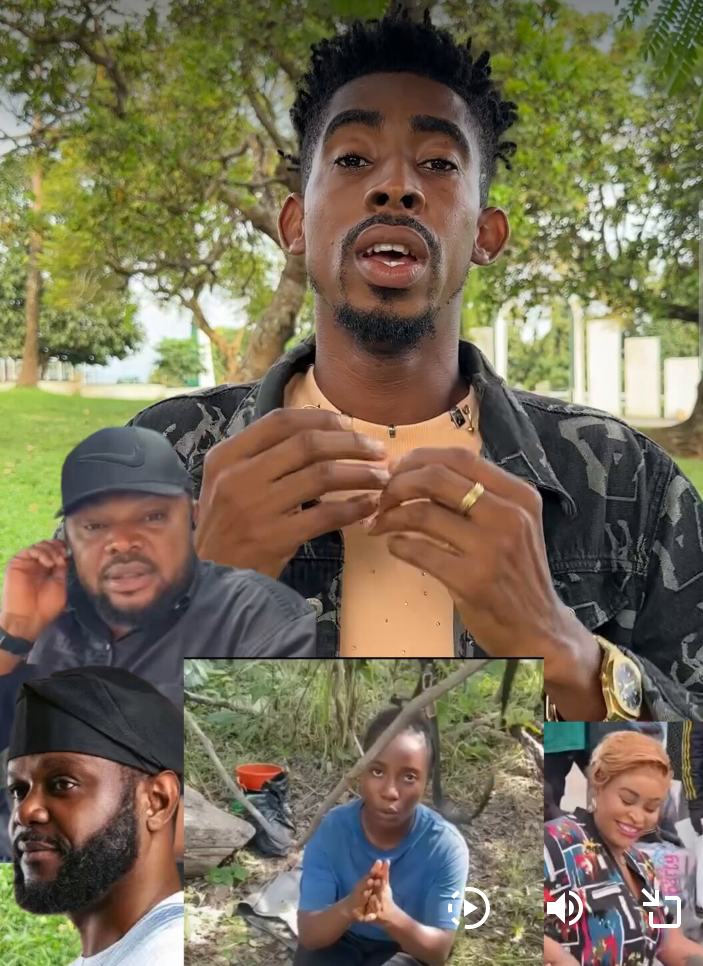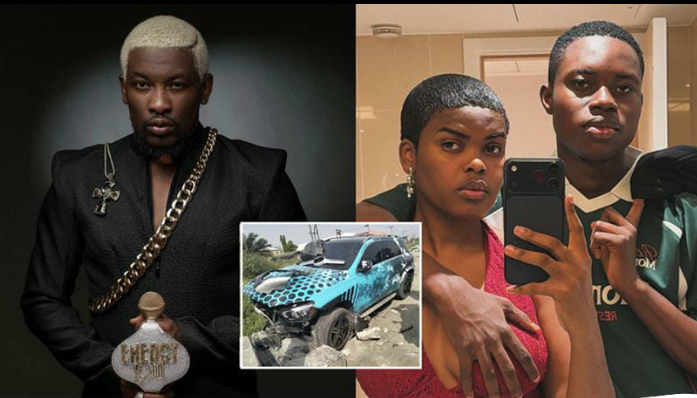
Comedian Koboko Calls Out Seyi Tinubu: ‘You Gave ₦20 Million to an Actress, But Ignored a Poor Mother Begging for Her Kidnapped Child’

Nigeria’s social media space was thrown into another wave of heated debate after popular comedian Koboko publicly criticized Seyi Tinubu, son of President Bola Ahmed Tinubu, over what he described as selective compassion. The comedian accused Seyi of showing generosity to celebrities while ignoring the plight of ordinary Nigerians facing life-and-death situations — particularly a poor mother whose daughter was recently kidnapped and whose video appeal for help has gone viral.
According to Koboko, while he acknowledges that Seyi Tinubu’s ₦20 million donation to Nollywood actress Sarah Martins was meant to support her charitable project to feed the poor and needy, it still paints a troubling picture of misplaced priorities. In his words, the gesture was commendable but unfairly selective, especially at a time when a helpless woman was publicly crying out for financial help to rescue her kidnapped child.
Koboko explained that he wasn’t condemning the act of helping Sarah Martins, but questioning why Seyi Tinubu — being not just a wealthy young businessman but also the son of Nigeria’s President — has remained silent on the cries of a struggling mother who openly begged for help. The comedian said that Seyi, as the son of the President, is not just any other Nigerian but a direct link to power — a “passageway” to the nation’s leader — and therefore carries a moral responsibility to use that influence for more urgent humanitarian cases.
In a video that has now spread widely across social media platforms, Koboko said in a passionate tone, “I know that Seyi Tinubu gave Sarah Martins money to continue her good work of feeding the poor. That’s not a bad thing at all. But right now, there’s a woman crying on the internet because her daughter has been kidnapped. She’s poor, she can’t afford the ransom they are demanding. She said she has nothing left. That woman also deserves help. Seyi should attend to her case too.”
The comedian’s emotional outburst quickly drew mixed reactions online. Some Nigerians praised him for having the courage to speak truth to power, arguing that Nigeria’s elite are often quick to sponsor celebrity projects while ignoring real tragedies affecting ordinary citizens. Others, however, accused him of unfairly politicizing a personal act of charity, saying that Seyi Tinubu cannot be expected to respond to every single distress call.
But Koboko stood his ground, emphasizing that compassion should not be selective or guided by popularity. He stressed that if the President’s son could comfortably release ₦20 million to an actress for her public-facing charity content, then he could at least reach out to a struggling mother who is begging for help to save her child’s life. To him, both causes — feeding the poor and saving a kidnapped girl — represent the same humanitarian value, but one has been ignored simply because it lacks media glamour.
The controversy has once again reopened public discussion about the state of insecurity and social inequality in Nigeria. Kidnappings, ransom demands, and violent abductions have become disturbingly common across the country, particularly affecting poor families who lack access to protection or rescue funds. For many Nigerians, Koboko’s criticism hits at the heart of a deeper problem — a system where help and empathy are often distributed based on fame and influence rather than urgency or need.
Sarah Martins, whose name sits at the center of this debate, had earlier trended after reports surfaced that she received ₦20 million from Seyi Tinubu to expand her outreach program that provides meals for underprivileged children. She publicly expressed gratitude for the gesture, stating that the funds would allow her team to “acquire a proper space” for their feeding initiative. However, Seyi Tinubu later clarified that he personally did not make the donation — rather, some of his friends contributed funds after seeing her viral video, and he only helped to facilitate the connection. Despite this clarification, the story had already taken on a life of its own, symbolizing what many now describe as a pattern of elite philanthropy being more about visibility than impact.
Koboko’s statement gave that perception new life. The comedian, known for his political satire and outspoken takes on national issues, argued that empathy from the rich should not depend on whether the recipient can generate social media traction. “We have too many poor people in this country crying every day. Not all of them have the platform Sarah Martins has,” he said. “If you can give millions to someone with millions of followers, why can’t you also help a woman who is on the street begging for her child’s life?”
His remarks resonated with many Nigerians who have grown weary of the widening gap between the country’s powerful elite and the struggling masses. Social commentators also observed that Seyi Tinubu, being in a unique position as both a philanthropist and the President’s son, attracts heightened scrutiny. Every public or private gesture he makes becomes symbolic — a reflection, fairly or unfairly, of how the ruling class treats the poor.
As the backlash spreads online, some supporters of Seyi Tinubu have defended him, insisting that his philanthropic record speaks for itself. They pointed out that he has funded youth empowerment programs, supported entrepreneurs, and sponsored educational initiatives across the country. But Koboko’s criticism underscores a different issue — not whether Seyi gives, but to whom, and why.
Many Nigerians are now asking the same question the comedian raised: Why do so many of the wealthy choose to donate through celebrities, influencers, or public figures, rather than addressing unseen cases where lives are literally at stake? The idea that a young girl’s life could be hanging in the balance while millions are given out for online content has struck a nerve.
The emotional video of the kidnapped girl’s mother — tearfully pleading for help to save her daughter — has become a haunting reminder of the everyday tragedies Nigerians endure. Her voice, frail but desperate, captures the reality that beyond headlines and hashtags, there are real people trapped in fear and helplessness. Koboko’s message, therefore, goes beyond one individual or one donation; it’s a call for conscience in a society where empathy too often depends on the camera lens.
While neither Seyi Tinubu nor his representatives have responded directly to Koboko’s remarks, public sentiment continues to simmer online. Whether the President’s son will take action or issue a statement remains to be seen, but the message has already landed: Nigerians are watching how their leaders — and their leaders’ children — respond not just to glamour, but to genuine human suffering.
In a country where inequality grows deeper every year, Koboko’s outcry serves as both a moral challenge and a social mirror. His words remind Nigerians that true generosity is not about who gets the spotlight — it’s about who gets saved.
Seyi Tinubu gave 20million to Sarah martins, but has ignored this girl that was kidnapped pic.twitter.com/NdVwUseA2n
— comediankoboko (@kobokolaugh) October 23, 2025


